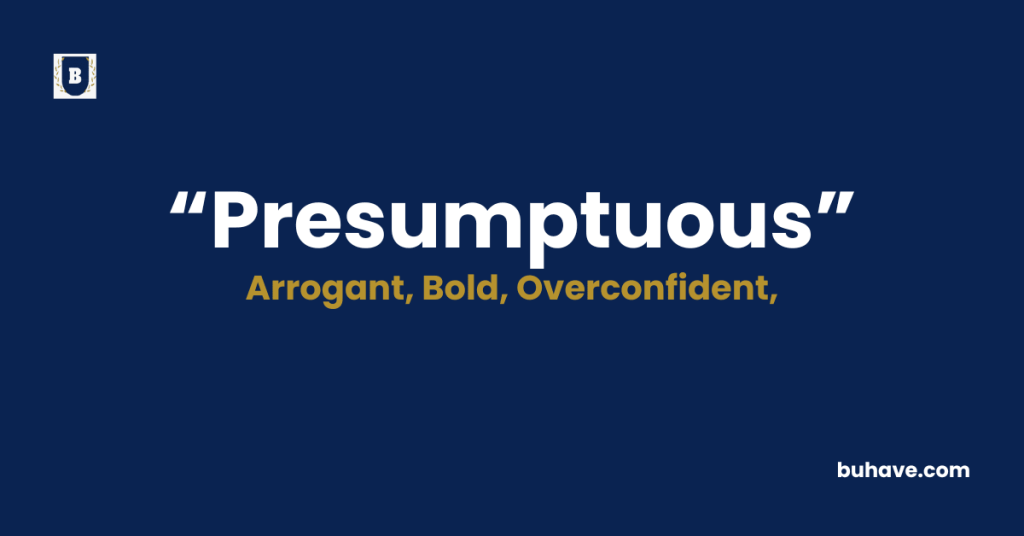The word Presumptuous (Adjective) refers to someone who takes liberties, acts inappropriately bold, or oversteps social boundaries, especially without permission or justification. In this guide, you’ll learn the full definition, synonyms, antonyms, etymology, and real-life examples of how to use Presumptuous correctly in sentences.
Presumptuous Explained in Depth
A complete and detailed guide to the word Presumptuous including meaning, definition, examples, etymology, synonyms, and antonyms.
Meanings of Presumptuous
Presumptuous means showing a lack of respect or awareness by acting too confidently or assuming too much. It often describes someone who intrudes, makes decisions, or speaks out without considering social norms, rules, or the feelings of others.
Definition
Presumptuous describes a behavior or attitude where a person assumes they have the right to do something without proper authority, invitation, or context. It involves a kind of inappropriate boldness, where the individual crosses a line whether socially, professionally, or personally without recognizing or respecting boundaries. This could include offering unsolicited advice, making personal comments, or taking actions that are out of place. Unlike confidence, which can be empowering and respectful, being presumptuous is often seen as disrespectful or overbearing.
It is used in both formal and informal settings to highlight behavior that reflects poor judgment or a failure to understand social dynamics. In communication, it’s important to strike a balance between initiative and respect for others’ space, perspectives, and authority.
Etymology
The word presumptuous comes from the Middle English presumptuos, derived from Old French and ultimately from the Latin praesumptuosus, which stems from praesumere meaning “to presume.” The Latin roots are prae- meaning “before” and sumere meaning “to take.” The original sense involved taking something before one had the right to do so implying entitlement or assumption. Over centuries, “presumptuous” came to describe not just premature action but boldness that oversteps limits.
It is now commonly used in both social and professional contexts to warn against taking liberties or making assumptions that could be seen as arrogant or out of place.
Example Sentences
- It was presumptuous of him to assume he would be promoted without asking or applying.
- She made a presumptuous comment about their relationship, even though she barely knew them.
- Walking into someone’s office uninvited can be considered presumptuous behavior.
Presumptuous Synonyms
- Arrogant
- Bold
- Forward
- Overconfident
- Insolent
- Impertinent
- Disrespectful
- Audacious
- Intrusive
- Pushy
Presumptuous Antonyms
- Respectful
- Humble
- Modest
- Cautious
- Polite
- Considerate
- Mindful
- Reserved
- Tactful
- Appropriate
FAQs about Presumptuous
Here are some frequently asked questions (FAQs) about the word “Presumptuous”
1. What does “presumptuous” mean?
It means acting too boldly or assuming things without permission or proper context, often seen as rude or intrusive.
2. Is being presumptuous always negative?
Mostly yes. It usually implies crossing boundaries or acting without regard for others’ feelings or authority.
3. How is “presumptuous” different from “confident”?
Confidence respects boundaries and is based on competence; presumptuousness oversteps boundaries and often lacks justification.
4. Can presumptuous behavior be unintentional?
Yes. People can be presumptuous without realizing it, especially in unfamiliar cultures or social settings.
5. How can I avoid being presumptuous?
By asking permission, listening more than speaking, and being mindful of tone, timing, and context in your interactions.

















